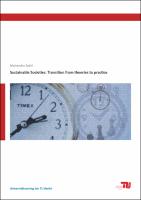Sustainable Societies: Transition from theories to practice
Author(s)
Sethi, Mahendra
Collection
AG UniversitätsverlageLanguage
EnglishAbstract
The national economic situation, rapidly changing societies, increasing environment pollution amidst global warming around us are some of the most burning topics in day-to-day discussions, news and scholarly discourses. What we see are only the consequences of protracted actions, policies and decisions. The issues associated with these phenomena are highly complex that challenge a direct interpretation of their root causations, indications, results and long-term impacts. For instance, is the issue of managing natural resources for industry & business operations within a country an economic problem? Or is it an ecological one? Or rather a social one? Could it be resolved with theories and techniques of either of these fields? Well, the issue and its redressal requires a combination of all the three disciplines. And yet actions to integrate all of these fields have typically by-passed one or more. The framework that has over the years most commonly explained the convergence of different spheres of disciplinary knowledge has been sustainability. At the same time, its pursuit in practice, the dominant public perception, political agendas and the mainstream media remains elusive. In absence of a critical theory on ‘sustainable societies’, the contemporary development model is misinformed by vague notions of greening, green growth, eco-development, ecotourism, smart cities, etc. largely steered by corporates and vested business groups. The contemporary societies exist and continue to develop without genuine knowledge about sustainability that lies fragmented in its contributing disciplinary streams. This book unfolds the inherent dilemmas, contradictions and paradoxes within the current sustainability paradigm to form a rather nuanced and inside view of what constitutes sustainability and how it could be realized with socio-technical, institutional, policy and management solutions. In the process, the research comprehensively reviews about a hundred environmental, social and economic theories to deliberate on the way forward. Considering that sustainability is a politico-economic and socio-cultural challenge, the transitions need to be culturally diverse and inter-generational, requiring infusion of fresh values, messaging and leadership while conserving traditional knowledge, prevailing institutions. The book culminates with a transition architecture bearing policy recommendations for governing without governmentality with plausible regulatory instruments, capacitating mechanisms, planning and voluntary measures that can be implemented in practice.
Keywords
sustainable societies; transitions to sustainability; environmental theories; sociological thought; macroeconomic theoriesDOI
10.14279/depositonce-12283ISBN
9783798332263, 9783798332263Publisher website
https://verlag.tu-berlin.de/Publication date and place
Berlin, 2022Classification
Sustainability
Regional and area planning


 Download
Download Web Shop
Web Shop